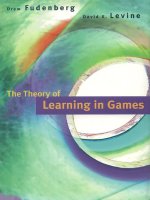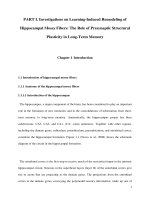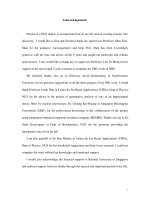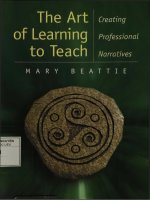7569 the rewards of learning
Bạn đang xem bản rút gọn của tài liệu. Xem và tải ngay bản đầy đủ của tài liệu tại đây (98.91 KB, 2 trang )
THE REWARDS OF LEARNING
E
xperts in the field of education like to tell the
story of an old man who was bothered by the noise of boys playing in his neighbourhood. He
offered to pay each boy a dollar to shout louder. The boys were delighted. But on the second
day the man said that his limited resources meant that he could pay the boys only 80 cents.
And on each successive day, he paid them less, until he finally didn’t pay them anything. The
boys got angry and stopped playing near his house. “We’re not going to make noise for
nothing!” they said.
This story demonstrated an important point. When we reward children for doing something
they enjoy, like playing a game, we destroy their natural desire to do that thing. This is
particularly clear in the field of education. If we want our children to learn, we kill their
natural curiosity and desire to learn when we offer them a reward.
Yet both parents and teachers often “bribe” children to learn by offering rewards. A
mother may offer her ten-year-old daughter sweets if she finishes reading a library book or a
film for doing all her homework. In high school, the reward is the mark. In such a system,
according to psychologists, the mark becomes the goal, not the learning. The greater the
emphasis on marks – by teachers, the schools and the universities – the harder the student
will work to get the “right answer”. But a lot of strategies for getting the right answer aren’t
good strategies for learning – like copying your neighbour’s exam paper, or studying only the
material you need for tests.
Educational experts have recommended changing the system of rewards, so that every
student can excel – but only if he really learns.
ANSWER THE QUESTIONS
FIND SYNONYMS
1.- Did the man really want the boy to make
more noise?
2.- Why did the boys stop playing near his
house?
3.- Did the man get his purpose?
9.- disturbed, upset
__________
10.- prize or bonus for
good behaviour
__________
11.- result of a test
__________
12.- aim, objective
__________
4.- What’s the point of the story?
WRITING : Pupils cheat because of the
tension and pressure at school. What’s
your opinion?
5.- What happens if parents offer a child a
reward for learning?
6.- How does a mark affect the way a pupil
studies?
7.- What are the disadvantages
educational system based on exams?
8.- Give examples of typical rewards
By Charo Díez
of
an
ANSWER THE QUESTIONS
1.- No, he didn’t.
2.- The boys stop playing near his house because the man stopped paying them.
3.- Yes, he did.
4.-The point of the story is that when we reward children for doing something they enjoy, like playing a game,
we destroy their natural desire to do that thing.
5.-If parents offer them a reward, they kill their natural curiosity and desire to learn
6.- The mark becomes the goal, not the learning
7.- Sometimes students copy their neighbour’s exam paper, or study only the material they need for tests.
8.- Sweets if a child finishes reading a library book or a film for doing all his/her homework
FIND SYNONYMS
9.- bothered
10.- reward
11.- mark
12.- goal
By Charo Díez









